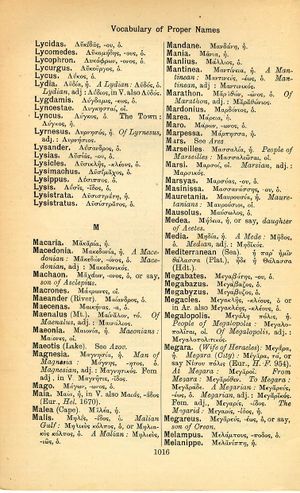Magnesia: Difference between revisions
(D_5) |
(Gf-D_5) |
||
| Line 1: | Line 1: | ||
{{WoodhouseENELnames | {{WoodhouseENELnames | ||
|Text=[[File:woodhouse_1016.jpg|thumb|link= | |Text=[[File:woodhouse_1016.jpg|thumb | ||
|link={{filepath:woodhouse_1016.jpg}}]]Μαγνησία, ἡ. | |||
<b class="b2">Man of Magnesia</b>: [[Μάγνης]], -ητος, ὁ. | <b class="b2">Man of Magnesia</b>: [[Μάγνης]], -ητος, ὁ. | ||
| Line 10: | Line 11: | ||
}} | }} | ||
{{Gaffiot | {{Gaffiot | ||
|gf=<b>Magnēsĭa</b>,¹⁴ æ, f. (Μαγνησία), Magnésie [contrée orientale de la Thessalie] : Plin. 4, 32 ; Liv. 42, 54, 10 ; [[Mela]] 2, 39 || ville de Carie près du Méandre : Nep. Them. 10, 2 ; Plin. 5, 114 ; Liv. 37, 45, 1 || de Lydie, près du mont Sipyle : Liv. 36, 43, 9 ; Plin. 2, 205. | |gf=<b>Magnēsĭa</b>,¹⁴ æ, f. (Μαγνησία), Magnésie [contrée orientale de la Thessalie] : Plin. 4, 32 ; Liv. 42, 54, 10 ; [[Mela]] 2, 39 || ville de Carie près du Méandre : Nep. Them. 10, 2 ; Plin. 5, 114 ; Liv. 37, 45, 1 || de Lydie, près du mont Sipyle : Liv. 36, 43, 9 ; Plin. 2, 205.||ville de Carie près du Méandre : Nep. Them. 10, 2 ; Plin. 5, 114 ; Liv. 37, 45, 1||de Lydie, près du mont Sipyle : Liv. 36, 43, 9 ; Plin. 2, 205. | ||
}} | }} | ||
Revision as of 07:32, 14 August 2017
English > Greek (Woodhouse)
Μαγνησία, ἡ.
Man of Magnesia: Μάγνης, -ητος, ὁ.
Magnesian, adj.: Μαγνητικός. Fem. adj., in V. Μαγνῆτις, -ιδος.
Latin > English (Lewis & Short)
Magnēsia: ae, f., = Μαγνησία,
I a geographical proper name.
A A country in Thessaly, on the Ægean Sea, Mel. 2, 3, 4; Plin. 4, 9, 16, § 32; Liv. 42, 54, 10; 44, 11, 3. —
B A city in Caria, on the Mæander, now Aineh Bazar, Plin. 5, 29, 31, § 114; Liv. 37, 45, 1; Nep. Them. 10, 2.—
C A city in Lydia, on Mount Sipylus, now Manisa, Plin. 2, 91, 93, § 205; Liv. 36, 43, 9; 37, 10, 12; 37, 11, 3.—Hence,
A Magnēsĭus, a, um, adj., = Μαγνήσιος, of or belonging to Magnesia, Magnesian: Magnesia flumine saxa, i. e. of the magnet, Lucr. 6, 1064; v. 1. magnes.—
B Magnessa, ae, adj. f., = Μάγνησσα, a Magnesian woman: Magnessam Hippolyten dum fugit abstinens, Hor. C. 3, 7, 18.—
C Magnētarches, ae, m., = Μαγνητάρχης, the chief magistrate of the Magnesians, Liv. 35, 31, 11; 35, 39, 6. —
D Magnētes, um, m., = Μάγνητες, the Magnesians, Liv. 33, 32; 34; 35, 31: (lapis) Magnetum quia sit patriis in finibus ortus, Lucr. 6, 909; Luc. 6, 385: Magnetas adit vagus exsul, Ov. M. 11, 408.—In sing.: Magnes, ētis, m., a Magnesian: Dionysius Magnes, Cic. Brut. 91, 316.—As adj., Magnes campus, Val. Fl. 2, 9.—
E Mag-nētis, ĭdis, adj. f., = Μαγνῆτις, of or belonging to Magnesia, Magnesian: cur umquam Colchi Magnetida vidimus Argo? (because built at Pagasae, in Magnesia), Ov. H. 12, 9.
Latin > French (Gaffiot 2016)
Magnēsĭa,¹⁴ æ, f. (Μαγνησία), Magnésie [contrée orientale de la Thessalie] : Plin. 4, 32 ; Liv. 42, 54, 10 ; Mela 2, 39 || ville de Carie près du Méandre : Nep. Them. 10, 2 ; Plin. 5, 114 ; Liv. 37, 45, 1 || de Lydie, près du mont Sipyle : Liv. 36, 43, 9 ; Plin. 2, 205.

